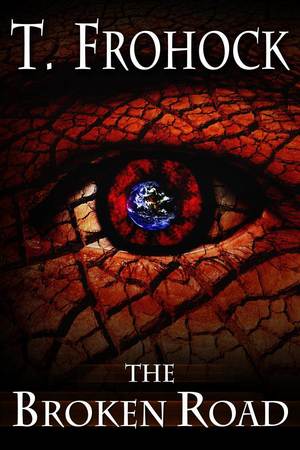The Hardest Part: Teresa Frohock on The Broken Road
← The Hardest Part: Stacey Cochran on Eddie and SunnyComing to Town: John and Carole Barrowman for NC Comicon →
The Hardest Part: Teresa Frohock on The Broken Road
Posted on 2014-11-13 at 19:20 by montsamu
North Carolina author Teresa Frohock’s debut fantasy novel Miserere was published by Night Shade Books back in 2011, and since she has been seen in a couple of anthologies: Manifesto: UF and Neverland’s Library Fantasy Anthology. Now she’s back with a more lengthy tale, this time a novella, The Broken Road, where “The world of Lehbet is under siege. The threads that divide Lehbet from the mirror world of Heled are fraying, opening the way for an invasion by an alien enemy that feeds on human flesh.” Here, Frohock writes about the difficulties in writing a mute protagonist.

By T. Frohock:
The hardest part of writing The Broken Road had to do with my protagonist, Travys, who is mute. In a film, Travys’ condition would be easily rectified, if not eloquently portrayed, through sign language and subtitles. Within a manuscript, Travys’ inability to communicate through dialogue presented several challenges for me. How would he “speak,” and more importantly, how would people unfamiliar with him be able to understand him?
While working on The Broken Road, I had the opportunity to read Robert Jackson Bennett’s novel The Troupe, which I highly recommend by the way. In The Troupe, Bennett portrays a character named Stanley, who does not speak. Bennett’s novel is set in the twenties, so Stanley carries a pad and pen in order to jot down short notes. These brief notes were always written in all caps to indicate Stanley’s words. The notes were succinct, yet Bennett managed to make the best use of a few words. Additionally, Stanley’s written notes were used sparingly.
Conversely, The Broken Road is set in a post-apocalyptic time period where paper and ink would be carefully hoarded and not easily carried. Having Travys use paper and pen wouldn’t work for my story. Also, where Stanley’s notes were only a few words or a couple of lines, Travys engages in somewhat longer exchanges. Long passages in all caps would become jarring to the reader and make it seem almost as if Travys was screaming his dialogue throughout the novella. Rather than all caps, I decided to use italics to indicate Travys’ dialogue.
Since writing implements and paper were more valuable to Travys’ society, I used sign language as Travys’ primary form of communication. Sign language presented its own obstacles. Anyone who has used sign language knows that signing is not a direct translation of English but is a language all its own.
For example, I would say, “I’m going to the store.” I would sign: I go store. Further context is delivered through body language and facial expressions. Of course, I couldn’t leave my reader guessing about context. I had to translate Travys’ signs into English and utilize gerunds, articles, and infinitives as if he was signing each word. This was the only effective way to communicate Travys’ words to the reader.
The second issue of communication with people who didn’t know him was a bit trickier and took some plot machinations to make it all work out. I can’t talk about that too much without giving away the plot, but suffice to say I had to think very hard about the characters and how they came to be where they were.
Writing stories with disabled characters challenges my storytelling skills, but I like working with these characterizations more than any others. I’ve even had some lovely comments about how readers have liked the fact that Travys was not a victim of his disability. He has found ways to work around his muteness so that he can work magic in spite of his inability to chant or sing. Like most people with disabilities, Travys is resourceful and courageous in the face of his challenges. I hope you enjoy reading his story as much as I enjoyed crafting it.
ABOUT THE AUTHOR
T. Frohock has turned a love of dark fantasy and horror into tales of deliciously creepy fiction. T is the author of Miserere: An Autumn Tale and has a short story, “Naked the Night Sings,” in the urban fantasy anthology Manifesto: UF. Another story, "Love, Crystal and Stone" appears in The Neverland's Library Fantasy Anthology. Her newest work is the novella, The Broken Road.T lives in North Carolina where she has long been accused of telling stories, which is a southern colloquialism for lying.
Web site: www.tfrohock.com
Twitter: https://twitter.com/T_Frohock
